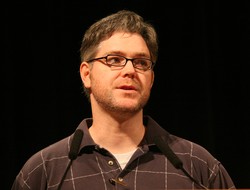“Church geek” is a label the Rev. Landon Whitsitt says he wears proudly.
And so, when the self-proclaimed “former fundamentalist Baptist turned born-again Presbyterian” and author of the newly published Open Source Church told the annual Moderators’ Conference here Nov. 18 that the Presbyterian Church (U.S.A.) needs to find “new metaphors, new ways of talking about what we’re doing as church,” the gathering of 150 presbytery and synod leaders was ready to listen.
What they probably weren’t ready for was the metaphor Whitsitt ― vice-moderator of the 219th General Assembly and newly elected executive for the Synod of Mid-America ― tossed at them: the online encyclopedia Wikipedia.
“The five ‘pillars’ of Wikipedia are very Presbyterian,” Whitsitt said. “They embody the way God and the new [PC(USA)] Form of Government have told us to behave. The PC(USA) is an ‘open source’ system ― we just need to start acting like it.”
“Open source” comes from computer software programming, Whitsittt explained. Every program has a “source code” that is either open (adaptable, amendable, flexible) or closed (hard-and-fast, fixed, unchangeable.)
Churches, Whitsitt argued, can be the same way: “They can be open and welcoming, creative and give off the sense that everyone has a sense of ownership; or they can be fairly closed, relying on old saws like ‘We’ve never done it that way before’ or ‘We don’t do it that way here’ or ‘That’s not where the table goes,’” he said.
Wikipedia is the ultimate (at least so far) open source system, Whitsitt said, and its “five pillars” reflect that:
- Wikipedia is an online encyclopedia, period ― “It’s not a dictionary, not a soapbox, not advertising for anything,” Whitsitt said. “It has a narrow purpose widely executed and the PC(USA) is the same ― our purpose is the six Great Ends of the Church and we live them out in our congregations and all around the world.”
- Wikipedia has a neutral point of view ― “I know this is the hardest pillar for Presbyterians to grasp,” Whitsitt said, “but Wikipedia focuses on verifiability, not ‘truth,’ which is often simply someone’s opinion about something. Some things, like gravity, are as true as we can know but there are very few things in the Christian life that are verifiably true ― only that Jesus Christ is Lord and Savior.”
- Wikipedia is free content ― “Neither Wikipedia nor the PC(USA) is a free-for-all or anarchistic,” Whitsitt said, “but no one editor owns the content, so all contribute to the collected wisdom of the community. Why should a Wikipedia contributor stay in a church where he or she is told what to think? That’s part of why I’m a Presbyterian.”
- Wikipedia operates in a civil and respectful manner ― “Respect and be polite even when you disagree, avoid edit wars, never engage in personal attacks, act in good faith and assume it of others” are the Wikipedia rules, Whitsitt said. “Wiki says, ‘We have millions of pages that need working on ― there’s too much to do to be arguing about petty things or attacking each other.’ How is the church any different than that?”
- Wikipedia does not have firm rules ― “Wikipedia tells contributors ‘Be bold and don’t worry about making mistakes. Previous versions are still there and together we can fix whatever’s wrong ― we’re just trying to make it work better,’” Whitsitt said. “What are we afraid of in the church? Our ground is in Jesus Christ, who is love, forgiveness and redemption. Sin boldly! It’s our relationships, not our rules, that will make us trust each other.”
That question of trust is absolutely crucial for the conflicted PC(USA), Whitsitt said. “What some call divided, I call balanced,” he said. “There is truth, but I don’t know it and no one else does, either.
“But God does,” Whitsitt said. “Do we really trust the sovereignty of God?”

